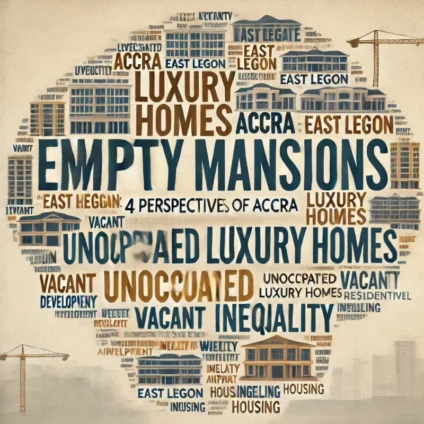Accra’s affluent neighbourhoods, such as East Legon, Cantonments, Trasacco and Airport Residential, are known for their stunning homes and opulent lifestyles. But amidst the grandeur, an unusual trend has emerged: large, fully furnished houses sitting vacant for months or even years. These unoccupied mansions have become a talking point for many across the city. We gathered four voices, each with a different perspective on what these vacant homes represent.
The Real Estate Agent
For Kwame Mensah, a seasoned real estate agent with over 15 years in the industry, the sight of empty mansions is not a new phenomenon. According to him, the boom in Accra’s real estate market has led to an oversupply of luxury homes.
“Many of these properties are built by wealthy Ghanaians living abroad or foreign investors who want to tap into the growing demand for high-end homes in Accra. But the truth is, the demand isn’t growing as fast as the supply. The upper class in Ghana is not large enough to fill all these homes, and many expatriates prefer renting rather than buying.”
He points out that the value of land in these prime areas continues to rise, making it a good investment for those who can afford it. “They don’t mind leaving these houses unoccupied because the value appreciates over time. They see it as a long-term investment. To them, it’s better than putting the money in the bank.”
The Local Resident
Akua Nyarko, a resident of East Legon for over 20 years, finds the trend of unoccupied houses puzzling and, in some ways, unsettling.
“Every morning, I pass by these huge, beautiful homes that nobody lives in. Some of them have perfectly manicured gardens and state-of-the-art security systems, but not a soul inside. It’s strange. I remember when I moved here, these neighbourhoods were full of life. Now, it’s almost like a ghost town in certain areas.”
For Akua, it feels wasteful, especially considering the housing struggles faced by many in Accra. “There are people in this city who are living in overcrowded conditions, struggling to afford rent, and then you see these empty houses just sitting there, untouched. It makes you wonder if we’re getting our priorities right as a society.”
The Aspiring Homeowner – Daniel Owusu
For Daniel Owusu, a young professional with dreams of owning his own home in Accra, the sight of these unoccupied mansions is both inspiring and frustrating.
“When I see these empty houses, part of me is motivated. I want to be successful enough to own a home like that one day. But the other part of me feels like it’s unfair. These properties are out of reach for most people in Accra, and they’re just sitting there. It’s discouraging when you think about how hard it is for the average person to even get a mortgage or afford a modest home.”
Daniel believes that while the luxury market is booming, there needs to be more focus on affordable housing. “There’s a big gap in the real estate market. We need more middle-income and affordable housing options. These empty mansions don’t solve the housing problem most of us are facing.”
The Developer – Nana Agyeman
Nana Agyeman, a real estate developer who has worked on several high-end projects in Accra, has a more pragmatic view of the situation.
“Many people don’t understand that building these luxury homes is a long-term investment. It’s not about selling the house tomorrow; it’s about holding onto the property because the value will increase in a few years. Accra is growing, and the demand for prime real estate will only increase as the city expands. We’re building for the future.”
He also notes that these unoccupied houses often belong to investors who live abroad. “They come to Ghana once or twice a year, and they want a place to stay that reflects their lifestyle. When they’re not here, the house remains vacant. But to them, it’s like owning a holiday home in another country—except this is in their homeland.”
Nana admits that the vacant homes might seem like a problem to outsiders, but from an investment perspective, it’s a strategy. “It’s not always about having someone living there. Sometimes, it’s about securing your investment and waiting for the right buyer or renter to come along.”
Conclusion
The unoccupied mansions in Accra’s affluent areas paint a picture of the city’s evolving real estate landscape. For some, they symbolise wealth and investment opportunities, while for others, they represent inequality and a misalignment of priorities. Whether viewed through the lens of real estate, community impact, or personal aspirations, these empty houses tell a complex story of a growing city grappling with both prosperity and disparity.
Latest Stories
-
UNICEF and REMAPSEN host World Health Day webinar
42 minutes -
Kumasi ready to buzz with Luv FM Family Party in the Park
53 minutes -
Catholic Bishop of Goaso Diocese solicits stakeholder collaboration to ensure peace
1 hour -
9 devastating student deaths that sent shockwaves across the country
1 hour -
Heal Komfo Anokye Project advances to second phase
1 hour -
No more direct refund for 1st-year university students under “No-Fee Stress” policy – Apaak
1 hour -
Kaakie was talented but didn’t have time for music – JMJ
2 hours -
Expert calls for urgent investment in neonatal health in West and Central Africa
2 hours -
Weija-Gbawe MP threatens legal action against ECG over persistent ‘dumsor’ in his constituency
2 hours -
Kwahu Business Forum will empower MSMEs, enhance economic growth, says ADB MD
2 hours -
Weija-Gbawe residents demand urgent action from ECG over persistent power outages
3 hours -
Searching for mobile phone signal – How Sanguli residents struggle with poor network
3 hours -
British High Commission supports Nigerian Rugby with international standard rugby Kits
4 hours -
Revenue Assurance and Compliance Enforcement: The Role of SML in Ghana’s Petroleum Sector
5 hours -
Division One League: Hohoe United petitions GFA over referee Emmanuel Asare
6 hours

